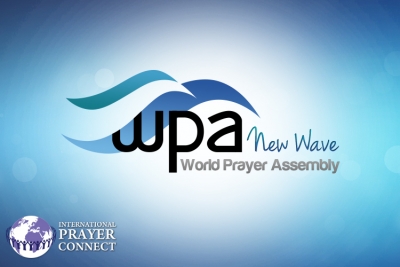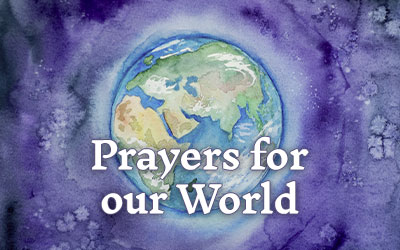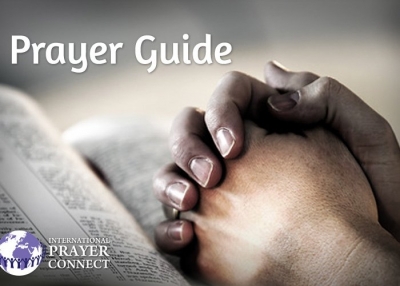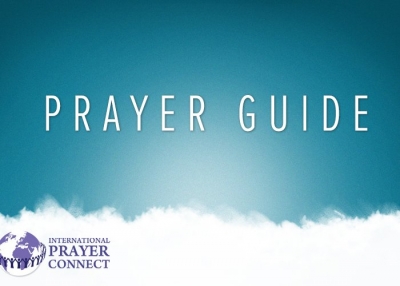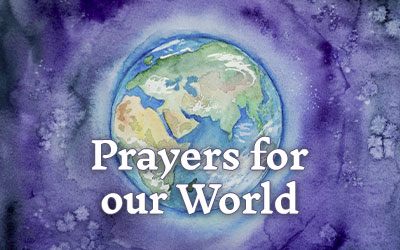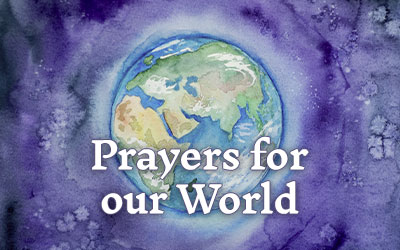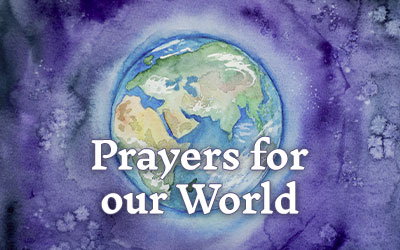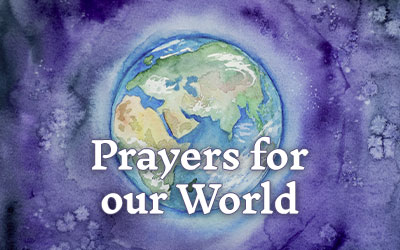“Let the New Wave of His Glory Fill the Earth!”
A New Paradigm
The World Prayer Assembly will be a “new paradigm” for an international congress of ministry and marketplace leaders. It will be an Acts 13-type encounter with the living God who longs to reveal Himself to those who are listening and wanting to implement His strategies for “prayer-action” that will revive and transform our world. Five early church leaders at Antioch gave the Lord opportunity to speak. The result was the launch of the mission movement to the Gentiles that brought the Good News of Jesus Christ to Europe and eventually around the world, changing human history more than any other movement. What will happen when 5000+ leaders gather in Jakarta to do the same? We believe it will be a “new wave” of His glory. It has the potential to bring revival and transformation to the nations as the Spirit of the Lord through the global prayer movement, joining with the mission and marketplace movements, rises up like a mighty spiritual tsunami, flowing back across the nations!
Hearing from the Lord of the Church
Many internationally known men and women of God like Dr. David Yonggi Cho, Dr. Enoch Adeboye, Suzette Hattingh, Cindy Jacobs, Luis Bush, Ed Silvoso, Graham Power, Tom Hess, Brian Mills, Ian Cole, Leslie Keegel as well as many prayer, mission and marketplace networks from around the world will join us in Jakarta. Some heads of state and other political officials have also been invited. We are not, however, gathering around great human personalities or important networks and organizations. We are gathering to seek the Lord of all the earth, the majestic God of glory, wisdom and love, and to hear from Him directly. His presence will be the main draw because we are convinced that He will speak as we give Him the opportunity to do so. Every presentation will be brief and given to facilitate prayerful encounter with God around a particular issue - so that we hear back from Him regarding His assignments for us corporately and personally.
Tri-Generational
The WPA will be tri-generational. One-third of the participants will be under age 30 for the leaders’ day sessions. In addition 40,000 youth and children will participate in the May 17 national stadium event, an event that will unite many millions of praying people within Indonesia and worldwide. Youth and children will be co-leaders of the WPA along with the adults. We recognize that God often uses the youngest and least known to convey His most important messages. We want to listen. As we partner with the younger generations and encourage them to share in leadership, we believe the Lord will raise up many new Josephs, Daniels, Samuels, Esthers, and Deborahs to do exploits for Him in generations to come.
Track Sessions According to Calling and Assignment
During our day sessions, approximately 40 2-hour track sessions will focus on various international issues, models of ministry and social spheres. Participants will have the opportunity to caucus according to their own choice and ministry calling. They will also hear updates on what is happening in that particular arena of concern. Together they will seek God with others who share their same passion for His strategies of “prayer- action” for the transformation of that issue or sphere.
Unity of the Body of Christ
The atmosphere of the WPA will be characterized by openness to God and others from diverse traditions and movements within the Body of Christ. We will meet in fulfillment of Jesus’ prayer in John 17 for true heart-unity within His Body. It will be a time of listening to the Father, Son and Holy Spirit and sharing what we believe the Lord is saying.
Prayer Saturated
The WPA will be saturated with prayer in many different formats and styles - personal, contemplative, pairs, triplets and small groups. We will also join in prayer together in plenary sessions led by adults, youth and/or children from the platform. We want to be open to the richness of what the Spirit is doing and saying throughout the Body of Christ, not foolishly thinking that our way of understanding and practice is necessarily the only right way.
Learning Together
It will be an adventure of learning from the Lord and one another, as we enthrone Him, submit ourselves in His Presence and we watch Him do His wonders among us.
Welcome to the World Prayer Assembly! Welcome to a time of encounter with the Lord. Welcome to a time that has the potential to shape the future history of His Church and our world.
“Suicide attacks by the Taliban against government targets over the last two days demonstrate the near futility of trying to negotiate with the group. Despite talks between the US and the Taliban over the last year and indications that the Obama administration is considering releasing Taliban prisoners from the Guantanamo Bay facility as part of a peace settlement, the Taliban thus far has shown no indications of agreeing to a cease-fire.” January 12, Newsmax.com
In addition, a BBC News report from January 6 states that the Taliban in Afghanistan are being “directly assisted by Pakistani security services, according to a secret Nato report.” This report, the result of thousands of interrogations, claims the Taliban “remain defiant and have wide support among the Afghan people.” The report also alleges that Pakistan knows the locations of senior Taliban leaders and has not divulged that information. After 10 years of war and the loss of thousands of lives and billions of dollars, this is very discouraging reading for Nato and the Afghan government.
A Pakistani foreign ministry spokesman denied these allegations calling them "ridiculous" and saying "we are committed to non-interference in Afghanistan and expect all other states to strictly adhere to this principle."
US Pentagon spokesman Captain John Kirby commented: "We have long been concerned about ties between elements of the ISI [Pakistan's intelligence service] and some extremist networks," said US Pentagon spokesman Captain John Kirby, adding that the US Defence Department had not yet seen the report.
Please pray for the peace and healing of both Pakistan and Afghanistan and for the cutting off of ties between Pakistan’s intelligence services and government with the Taliban. This is such a strategic part of the world and we need to keep covering it in our prayers of intercession with faith for breakthrough.
Pakistan was created in 1947, in a terrible blood bath, as the only nation created to be a Muslim republic:
• 6th most populous nation in the world
• 96% Muslim
• 1.5 % Christian
• 1.5 % Hindu
• 0.5-1 % Buddhist, Jain, etc.
Economy
• Four years ago, under President Musharraf’s government, Pakistan had the one of the fastest growing economies in Western Asia. Today, it is right at the bottom.
• In the 2010 floods, the UN proclaimed it the worst human disaster (twice as many people affected as the Indian tsunami, the 2005 Pakistan earthquake, and Haiti earthquake, combined). One-fifth of the country was under water - crops, fields, and the infrastructure of electricity, canals, roads were destroyed. Most of this still has not been repaired. Summer of 2011 another major flood covered much of the southern part of Pakistan. Crops, homes, livestock were destroyed. Today many places are still under 10 feet of water.
• Much of the county is without electricity and/or gas 10-18 hours a day.
• Food prices for basic staples of vegetables and flour have almost tripled in the last 2 years.
Government
People are fed up with the present government of Zardari. Corruption is listed as some of the worst in the world. In the midst of this economic collapse and the inability of the present government to govern, five other political parties are fighting for leadership. Taliban/Militants are growing in popularity as they use Satan’s weapon of FEAR.
”For our struggle is not against flesh and blood, but against the rulers, against the authorities, against the powers of this dark world and against the spiritual forces of evil in the heavenly realms.” Eph 6:12
Pakistan has a definite hierarchy of SPIRITUAL FORCES/LEADERS. Both religious and government leaders are in submission to them…They are Satan’s agents to “steal, kill and destroy.” Under the influence of these spiritual powers, hardcore Islam is growing rapidly and spreading across the country and the world. The Taliban and Al-Qadea are quickly expanding their influence. They claim they can save Pakistan from corruption, claiming that democracy has not worked, and Pakistan must return to Allah’s laws of sharia.
• Pray against these evil spiritual leaders and agents of Satan. May their strongholds fall and people be freed.
• Pray for fear to be removed and prayer leaders to be raised up.
• Pray for yourselves that God will increase your burden for Pakistan.
Christians in Pakistan
Christians live under the constant oppression of Islam. It is difficult for them to get an education or jobs. Attacks by militants against Christians and churches are increasing.
PRAY:
• May Pakistani Christians quickly realize that their only hope of survival is to turn to God in prayer. 2 Ch 7:14
• Pray that eyes may be quickly opened. We are learning that most Christians are
• completely blind to these evil SPIRITUAL FORCES/LEADERS and their strongholds that surround and entrap them.
• Pray for Christians to be bold.
• Pray they may learn to pray and know the authority they have in Christ and to use that authority to pray and tear down the evil ones strongholds.
• Pray that they will see answers to their prayers as one by one these strongholds that cover the country are pulled down.
GOD, RAISE UP A REMNANT OF PRAYER INSIDE AND OUTSIDE PAKISTAN.
We have already sent hundreds of invites, commitment forms to churches and ministries across 50 cities in all the provinces. Thousands of posters, handbills, and printed prayer points have already reached people who took part in the last year’s campaign. About 70 coordinators/facilitators and volunteers will be motivating new churches and ministries to be a part of this campaign. We hope to register 2000 churches/ groups/ ministries and individuals across the country to pray targeted strategic prayers for the Pakistani Church and Country during these 40 days.
Therefore we urge you to kind pray for this campaign and its success and for the core team in Rawalpindi and Islamabad, 70 plus facilitators and coordinators (around the country) and for hundreds of churches, groups, ministries and families taking part in this campaign.
There is a major arms buildup going on as Gulf states respond to the rising threat of Iran in the region that could threaten their security. They are buying billions of dollars of weapons from U.S. defense firms. Iran continues to flex its muscles within Iraq and elsewhere, and some American intelligence officials have warned that it may try to strike the United States with a terror attack.
Potential Dangers with Iran
“Iran is striking back at countries that have imposed sanctions with military and economic threats and may soon be willing to launch attacks on its enemies in the West. European countries are likely to be the first targets of economic reprisals given the announcement by Tehran that it may immediately cut off oil exports to Europe ahead of the EU embargo taking effect. Several large multinational corporations, including British/Dutch oil company Royal Dutch Shell (London: RDSA) as well as Japanese and South Korean companies such as Mazda, Kia, and Samsung do significant business in Iran and could be expelled because of support of sanctions by their home countries.
This week, the seriousness of Iranian defiance of international pressure over its nuclear weapons program was brought into sharper focus. On Sunday, an Iranian parliament member said his country may respond to the EU oil embargo – scheduled to be gradually implemented over the next five months – by banning oil sales to Europe for five to 15 years. Iran reportedly will cut off of sales of oil to Europe next week. On Tuesday, the U.S. intelligence community warned in its annual worldwide threat report to Congress that Iranian leaders are now willing to launch attacks inside the United States, basing this assessment on the uncovered Iranian plot to assassinate the Saudi ambassador to the United States in a restaurant in Georgetown, in Washington, D.C.”
February 2, LIGNET.com
Please pray for the economic sanctions to have their desired impact so that Iran is dissuaded from continuing its nuclear program that could destabilize and threaten many other nations in the region and elsewhere. Pray for His peace in the Middle East to be restored and maintained and for His protection over the USA and other Western countries from terrorist attacks.
Open Doors has offered some excellent resources to help us pray for persecuted believers and their nations. Please have a look at them, share them with your church or prayer group and remember them in your prayer. Here are the helpful links to find information and prayer items for each of the 50 nations:
http://www.opendoors.org/
http://www.opendoorsusa.org/persecution/country-profiles/
http://www.opendoorsuk.org/resources/country_profiles.php
Open Doors 2012 World Watch List reports that “North Korea tops the list for the 10th straight time as the country where Christians face the most severe persecution, while Islamic-majority countries represent nine of the top 10 and 38 of the 50 countries on the annual ranking.
Afghanistan (2), Saudi Arabia (3), Somalia (4), Iran (5) and the Maldives (6) form a bloc where indigenous Christians have almost no freedom to openly worship. For the first time Pakistan (10) entered the top 10, after a tumultuous year during which the nation’s highest-ranking Christian politician, Cabinet Minister Shahbaz Bhatti, was assassinated for his attempts to change the blasphemy law. The rest of the top 10 is composed of Uzbekistan (7), Yemen (8) and Iraq (9). Laos was the lone country to drop from the top 10 list, falling to No. 12 from No. 10.
While persecution has worsened due to persecution by Muslim extremists, without question North Korea once again deserves its No. 1 ranking. Defiantly Communist, North Korea built a bizarre quasi-religion around the founder of the country, Kim Il-Sung. Anyone with ‘another god’ is automatically persecuted. The estimated 200,000 to 400,000 Christians in this country must remain deeply underground. An estimated 50,000 to 70,000 Christians are held in ghastly prison camps. “How the death of Kim Jong-Il last month and the coming to power of his son Kim Jong-Un will affect the status of Christians in North Korea is hard to determine at this early stage,” Open Doors USA President/CEO Dr. Carl Moeller said. “Certainly the situation for believers remains perilous. Please pray with me that the Lord will open up North Korea and there will be religious freedom to worship the One, true God, not the gods of Kim Jong-Il and Kim Il-Sung.”
"Being a Muslim Background Believer is a huge challenge."
There are significant moves on the World Watch List, including Sudan moving up 19 spots to No. 16 – the biggest leap of any country from 2011. Nigeria jumped 10 spots to No. 13. Egypt, racked by violent protests and upheaval during the Arab Spring, rose four positions to No. 15. Increased Islamic extremism triggered the upward movement of Sudan, Nigeria and Egypt. “Being a Muslim Background Believer or ‘Secret Believer’ Christian in a Muslim-dominated country is a huge challenge. Christians often face persecution from extremists, the government, their community and even their own families,” said Moeller. “As the 2012 World Watch List reflects, the persecution of Christians in these Muslim countries continues to increase. While many thought the Arab Spring would bring increased freedom, including religious freedom for minorities, that certainly has not been the case so far.”
In July 2011 southern Sudan, which is mostly Christian, seceded to become an independent country, called South Sudan, leaving the Christians of North Sudan much more isolated under President Omar al-Bashir. In response to the loss of the south, al-Bashir vowed to make constitutional changes to make his country even more Islamic. On the ground the military has attacked Christian communities in battles over resources with many being killed.
Nigeria remains the country with the worst atrocities in terms of lives lost. More than 300 Christians were martyred last year in Nigeria, though the actual number is believed to be double or triple that number. The total is probably greater in North Korea, but impossible to confirm due to its isolation. Since 2009 the extreme Islamic group Boko Haram has destroyed more than 50 churches and killed 10 pastors in Nigeria.
Christians in Egypt experienced a disastrous start to 2011 when a bombing at the Coptic Orthodox Church of Saint Mark and Pope Peter in Alexandria killed 21 Christians on New Year’s Day. After the ouster of President Hosni Mubarak in February, hopes soared for new freedoms for all Egyptians. But on Oct. 9 the military turned on its own citizens in the Maspero massacre in Cairo, killing 27 Coptic Christian demonstrators. At the close of 2011, Islamist parties flourished in the November elections, prompting some to speak of an Arab Winter instead of an Arab Spring for Christians. "We wouldn't be growing if we didn't have a price to pay for our witness."
China still has the world’s largest persecuted church of 80 million, but it dropped out of the top 20 this year to No. 21. Last year China ranked No. 16. This is due in large part to the house church pastors learning how to play ‘cat and mouse’ with the government. The good news behind the bad news of rising persecution is an increase in church growth, which often results from the persecution itself. A pastor in Iran states: “We wouldn’t be growing if we didn’t have a price to pay for our witness.”
The WWL is based on a questionnaire devised by Open Doors to measure the degree of persecution in over 60 countries. The questionnaires are filled out by Open Doors field personnel working in the countries, and cross-checked with independent experts, to arrive at a quantitative score per country. Countries are then ranked according to points received. An estimated 100 million Christians worldwide suffer interrogation, arrest and even death for their faith in Christ, with millions more facing discrimination and alienation. Open Doors supports and strengthens believers in the world's most difficult areas through Bible and Christian literature distribution, leadership training and assistance, Christian community development, prayer and presence ministry and advocacy on behalf of suffering believers. “
Dear Praying Friends!
My heart is so broken for my nation! The nation is under huge attack from the evil one! Egyptians against Egyptians. Chaos. Almost no security existing!
Last night, February 1st, after a soccer game, 74 people were killed and about 300 injured. Read more: http://www.bbc.co.uk/news/world-middle-east-16848473
This is a cry on behalf of 88 million people in Egypt!
• Pray for mercy.
• Pray for the Christians to have the spirit of wisdom and revelation.
• Pray that the Lord would expose the evil one and his plans to steal, destroy, and kill.
• Let the Lord give you His heart for Egypt.
Thank you for your prayers. Thank you for standing at this urgent time of need!
